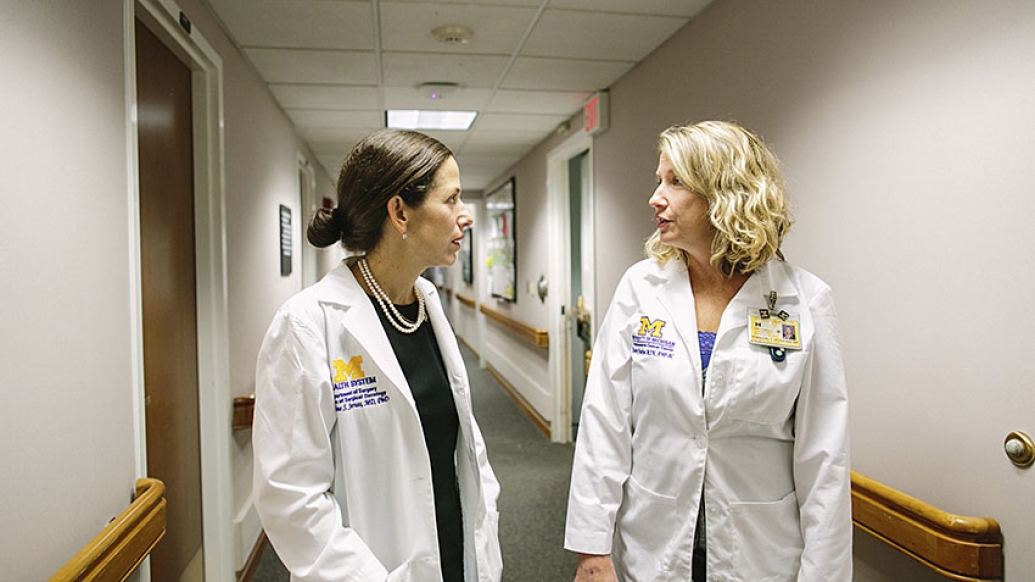A breast cancer diagnosis does not have to derail plans for future children. Michigan Medicine experts describe the options to preserve fertility.
11:01 AM
Author |

Being diagnosed with breast cancer before age 40 does not have to mean giving up plans for future children. With a highly coordinated, multidisciplinary strategy, newly diagnosed women can act quickly to fully explore their fertility options without delaying or compromising cancer care.
A new paper from University of Michigan Rogel Cancer Center experts summarizes the latest science at the intersection of breast cancer treatment, fertility preservation and pregnancy, and offers guidance to women and their doctors for reaching better informed, more timely care decisions. Published in Annals of Surgical Oncology, it is co-authored by seven U-M specialists from surgery, medical oncology, reproductive endocrinology, obstetrics and gynecology, pathology and biomedical engineering.
How breast cancer treatment impacts fertility
Cancer treatment threatens fertility in two ways. "First, some cancer therapies can damage the ovaries," explains Jacqueline Jeruss, M.D., Ph.D., a surgical oncologist and director of the Rogel Cancer Center's Breast Care Center.
"But perhaps an even bigger threat is time," she adds.
About 70 percent of breast cancers are treated with estrogen-blocking drugs like Tamoxifen, which are taken for five to 10 years. These drugs can pose significant risks to unborn babies, so women are advised to avoid pregnancy during that timeframe – which can mean forgoing peak years of fertility.
"Fertility is extremely important to young women," Jeruss says. "Research has shown that as many as 30 percent of breast cancer patients may forgo some or all of their cancer treatment – compromising disease outcomes – to try to retain the ability to have a child. As an oncologist, that tells me we're not doing enough to educate women and help them connect with fertility experts to make informed decisions."
Options before beginning cancer treatment
The key is to act quickly. There is a very real – but relatively narrow – window of opportunity for a woman to explore fertility preservation strategies after diagnosis, without interrupting her cancer treatment.
"When we see a young patient for the first time in the Breast Care Center, our top priority is to educate the patient about her cancer and her treatment plan. After that, if the patient is interested, within 24 to 48 hours we connect her with the fertility preservation team," Jeruss says.
There, the focus is on evaluating the patient's fertility, based on factors like her age and the type of treatment that may be needed before or after surgery. Based on that assessment, some fertility preservation techniques can be initiated immediately so as not to delay the start of treatment.
Research has shown that as many as 30 percent of breast cancer patients may forgo some or all of their cancer treatment – compromising disease outcomes – to try to retain the ability to have a child.Jacqueline Jeruss, M.D., Ph.D.
The most well-established option for preserving fertility is cryopreservation, harvesting a woman's unfertilized eggs (oocytes) or fertilized eggs (embryos) and freezing them for future implantation. This is the same process followed by infertile couples pursuing in vitro fertilization.
With careful coordination, this preservation process can be completed before or immediately after surgery, but before initiating chemotherapy.
"It takes two weeks of ovarian stimulation hormones to prepare eggs to be harvested," says Molly Moravek, M.D., Ph.D., director of the Fertility Preservation Program within Michigan Medicine's Center for Reproductive Medicine. "We aim to begin that process within days of diagnosis. We're often able to initiate the hormone injections, then perform breast surgery, and then perform the egg harvesting procedure as soon as two weeks after surgery. That way the eggs are safely preserved, and the woman is ready to begin chemotherapy as soon as she's recovered from surgery."
Since it is standard to begin chemotherapy within 28 days of surgery, this scenario won't delay treatment. In fact, a second attempt to harvest eggs prior to chemotherapy may be possible – an option for women who may not generate as many eggs during their initial stimulation.
"Women should know that the procedure is well-established, with a complication rate of less than 1 percent," says Moravek. "Some may also worry that the hormones used worsen cancer survival rates and increase the risk of recurrence. But our review of the research revealed no evidence that these medications impact breast cancer outcomes."
With improvements in freezing techniques, both unfertilized eggs and embryos can be harvested and frozen with equally positive outcomes, Moravek notes.
"A frozen egg is essentially equivalent to a freshly-harvested egg, so there is no need to create embryos unless a woman elects to do so," she says. "Also, we used to think cryopreservation could only be performed at one point in a woman's cycle. We now know that ovaries send up eggs continuously. So ovarian stimulation can begin right away."
In some cases, fertility preservation may still be an option after treatment.
"While a woman is more likely to enter menopause early following cancer treatment, if she has even some remaining ovarian function, oocyte cryopreservation may still be possible," says Moravek. "Our program offers post-treatment assessment and counseling for women interested in exploring this option."
Emerging techniques offer more options
One alternative available at Michigan Medicine is an injectable drug called a GnRH agonist.
"These medications shut down the signals the brain sends to the ovaries to develop eggs, creating a state similar to menopause," Jeruss says. "Chemotherapy attacks the body's actively dividing cells. Since a GnRH agonist can halt activity in the ovaries, it may make them less vulnerable to chemotherapy."
The team reviewed the available clinical data for their paper, concluding that GnRH agonists, which can be combined with other fertility preservation options, are effective in preserving ovarian function.
SEE ALSO: 'When Are We Going to Cure Cancer?': The Bright Future of Breast Cancer Research
Another emerging technique not yet widely available involves removing all or part of the ovary and freezing tiny strips of its lining. Called the ovarian cortex, this lining holds the follicles containing the oocytes. At a later date, the ovarian cortex tissue can be reintroduced into the patient. Ongoing research at the Rogel Cancer Center is looking at ways to develop the most promising oocytes in the lab, so that they can eventually be fertilized, as is the case with in vitro fertilization.
"An intriguing aspect of ovarian cortex transplantation is that it also restores endocrine function," Jeruss says. "We don't currently offer this option at the University of Michigan, but it has been successfully employed at centers in the U.S., Europe, Asia and Israel, and we are interested in the potential for this option."
Additional paths to becoming a parent
Jeruss and Moravek stress that fertility counseling also covers alternatives not detailed here, including taking no action to protect fertility, pursuing adoption and exploring the use of a donor egg.
"After understanding all their options, many women choose one of these alternatives. As a team, we support whatever choice a woman makes," Moravek says.
"Clearly, fertility preservation is not an easy topic, and cryopreservation isn't an easy process," she adds. "That's why we have a patient coordinator who helps guide women through every step. And research shows that patients who received fertility counseling, even if they chose to take no action, felt better about their treatment decisions."
Jeruss and Moravek feel their approach is both optimistic and realistic.
"We want a woman to know that her doctor – her whole team – believes in her survival," Jeruss says. "We're committed to our patients' health and survivorship after a cancer diagnosis and treatment, and we want our patients to have options for family planning incorporated into both treatment and future survivorship goals."
Questions about fertility preservation before cancer treatment? Call the Cancer AnswerLine at 800-865-1125.

Explore a variety of healthcare news & stories by visiting the Health Lab home page for more articles.

Department of Communication at Michigan Medicine
Want top health & research news weekly? Sign up for Health Lab’s newsletters today!





